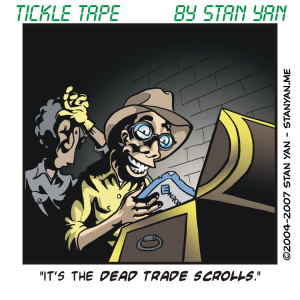The markets are often chaotic and uncertain. It is often unclear what will happen next. The astute trader is aware of this uncertainty and takes steps to prevent it from adversely influencing trading decisions. Some traders feel uneasy when they are uncertain. They are anxious and afraid. It’s reasonable to feel these emotions; it’s almost a form of protection away. Our psyche perceives the uncertainty and we want to do something specific to alleviate the uneasiness. There are a few key ways that you can acknowledge this uncertainty and
Manage Your Risk: It’s very difficult to control fear when you have a great deal of money on the line. That’s why most traders tend to risk relatively small amounts of capital on any single trade; they also use protective stops and have clearly defined exit strategies. Putting less money on the line with each trade is an effective way to decrease the fear of losing money. Similarly, it’s important to trade with money you can afford to lose. If you trade with money that you badly need to pay basic living expenses, you will have a valid reason for fearing a loss. It will be difficult to fool yourself, so don’t bother trying. If you can’t afford to lose your stake, build up your account balance and stand aside until you can calmly put a bet down without concerning yourself with the adverse consequences of a possible loss.
Admit Your Fears: Some people were taught as children to hide their fear, to pretend that they were courageous in the face of adversity. But trying to hide your fear often makes it even more difficult to control. It’s better to just admit that you are afraid, and admit that there is, indeed, a good chance that you will lose money on your trades. You’ll find that once you admit the possibility of loss, you’ll feel much better, and control fears more easily. In his book, “Trading to Win,” Dr Ari Kyiv offers a quick and sometimes effective way of controlling fear: Acknowledge you are afraid and the feeling will pass. Refuse to acknowledge the fear and it will perpetuate. So admit you are afraid and the fear will disperse.
Know Your Personality: Humans differ in their ability to control the fight-or-flee response. Some people are easily frightened. Their nervous systems are rapidly aroused and once energized, it’s hard to calm down. Other people are fearless. They tend to stay calm across a wide range of situations, even those that would frighten most people. It takes a lot to get their nervous system aroused and energized. It’s important to know where you stand on the fear-tolerance continuum. If your tolerance for fear is low, it’s going to be harder to control your fear than others, and you’ll do yourself a disservice by acting as if you do not have a problem with fear. It’s essential to have a specific fear control plan.
Those with a low tolerance for fearful situations may need to paper trade until they master their fears. Others may need to seek professional help to learn structured techniques, such as systematic desensitization. For others, it may be necessary to adjust one’s trading strategy. One may be so prone to experience fear that it may be necessary to make only long-term investments, where quick decisions are less urgent. Or when trading in the shorter term, it may be useful to use the automatic settings on trading software to exit or place specific orders with a broker over the phone. Regardless of the strategy one uses, it’s vital to gauge one’s fear of tolerance and take appropriate steps to compensate.


